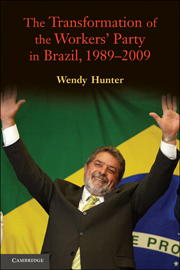Book contents
- Frontmatter
- Contents
- Tables, Charts, and Figure in Text
- Tables and Chart in the Appendix
- Acronyms
- Acknowledgments
- 1 Introduction: Understanding the Normalization of the Workers' Party
- 2 Strategic Change or Organizational Persistence? Evolution of the Workers' Party
- 3 Opposition Politics: The PT in the Chamber of Deputies
- 4 The PT in Municipal Government: The Pragmatic Face of the Party
- 5 Striving for the Presidency: From Opposition to Government
- 6 New Challenges and Opportunities: The PT in Government, 2003–2009
- 7 Analytical Implications and Comparative Perspectives
- Appendix
- References
- Interviews
- Index
4 - The PT in Municipal Government: The Pragmatic Face of the Party
Published online by Cambridge University Press: 05 June 2012
- Frontmatter
- Contents
- Tables, Charts, and Figure in Text
- Tables and Chart in the Appendix
- Acronyms
- Acknowledgments
- 1 Introduction: Understanding the Normalization of the Workers' Party
- 2 Strategic Change or Organizational Persistence? Evolution of the Workers' Party
- 3 Opposition Politics: The PT in the Chamber of Deputies
- 4 The PT in Municipal Government: The Pragmatic Face of the Party
- 5 Striving for the Presidency: From Opposition to Government
- 6 New Challenges and Opportunities: The PT in Government, 2003–2009
- 7 Analytical Implications and Comparative Perspectives
- Appendix
- References
- Interviews
- Index
Summary
In this chapter I analyze the role of mayoral elections and local government officeholding in shaping the PT's development. Invoking principles from rational choice, I seek to understand how the PT adapted and learned from its experience in municipal government. If leading the legislative opposition positioned the PT to maintain far-left stances on issues of national importance, the institutional requirements of winning mayoral elections and the array of challenges and responsibilities involved in governing cities motivated the party's mayoral candidates and officeholders to enact changes that reflected greater moderation and pragmatism. Rational choice institutionalism would expect that the institutional context of mayoral elections and municipal government would induce such changes.
However, combining the role of governing cities with the PT's transformative political project and maintaining smooth relations with local party adherents often proved problematic, especially in the beginning. Adaptation took place only after considerable internal conflict. Historical institutionalism sheds light on the tensions that preceded and surrounded the process of adaptation. This was summed up well by a leading PT figure: “The major problem, when we analyze the role of our mayors and governors, lies in how to combine the governing of cities and states with the national political struggle” (Dirceu 1999: 19, author's translation). Many of the fiercest battles fought within the party concerned contradictions stemming from the simultaneous opposition and governing roles played by the party. Similarly, tensions arose between party officials at the local and national levels and the mayors themselves.
- Type
- Chapter
- Information
- Publisher: Cambridge University PressPrint publication year: 2010



